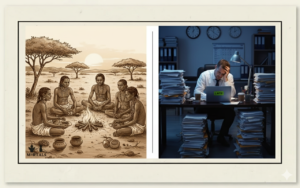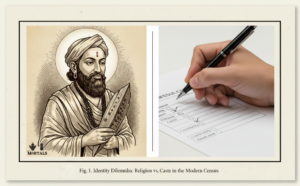Introduction: Charting the Course of Indian Anthropology
Welcome to this in-depth exploration of the Emergence and Growth of Anthropology in India, a cornerstone topic for the UPSC Mains. This subject is not just a chapter in the syllabus; it’s the story of how India has been studied, understood, and administered, from the colonial era to the present day.
This post serves as a comprehensive, topic-wise bank of all Previous Year Questions (PYQs) asked by the UPSC on this topic, from 1985 to the latest exam. By analyzing these questions, you can move beyond simple chronological study and begin to see the patterns, high-yield sub-topics, and recurring debates (like Elwin vs. Ghurye) that the exam consistently favors.
This resource is designed to help you strategically master the contributions of scholar-administrators and the legacy of pioneering Indian anthropologists.
1. General Growth & Development of Indian Anthropology
This category includes broad, essay-style questions about the overall trajectory and features of anthropology in India.
- Write an essay on the growth of Anthropology in India. (1985)
- Briefly describe the highpoints in the growth of Indian anthropology. (1987)
- Write a note on Distinctive features in the growth of Indian Anthropology. (1992)
- Give a brief summary on the growth of Indian Anthropology indicating the factors responsible and the results achieved. (1994)
- Assess the growth and development of Anthropology in India. Illustrate the contributions of early twentieth century Anthropologists in Tribal and Caste studies. (1997)
- Give an account of the contributions of Indian scholars in the growth and development of Anthropology in India in early 20th century. (2005)
- Briefly discuss the contribution of Indian anthropologists during 20th century. (2006)
2. Colonial Period & Scholar-Administrators
This section focuses on the 18th, 19th, and early 20th-century figures, including British administrators and other foreign scholars.
- Critically examine the contributions of some of the British scholar administrators to Indian anthropology. (2002)
- Evaluate the contribution of American anthropologists to Indian anthropology. (2011)
- Trace the trajectory of encyclopaedic work on tribes and castes of South India With special reference to Ananthakrishna Iyer’s contribution. (2012)
- Write a note in 150 words on Contribution of H. H. Risley to the Aryan’ debate. (2014)
- Write about the contribution made by Christoph von Furer-Haimendorf to tribal anthropology in India. (1995 & 2016)
- Examine the colonial administrators view that Indian villages can be considered as ‘little republics’. (2018)
- Write about the role of colonial administration in the development of Anthropology in India. (2019)
- Deconstruct the colonial history of Indian Anthropology highlighting the critical role played by the Indian Anthropologists in sustaining its autonomy. (15M/2024)
3. Contributions of S. C. Roy
As a foundational figure, S.C. Roy is a high-frequency topic.
- Estimate the contributions of S.C. Roy in the field of ethnography and his influence on the growth of Anthropology in India. (1996)
- Write a note on S.C. Roy’s contributions to anthropology. (2001)
- Compare the contributions of S.C. Roy and Verrier Elwin to tribal ethnographies in India. (2012)
- Discuss the contributions of S.C. Roy to understanding the tribes of India. (2014)
- Discuss the contribution of S. C. Roy in the study of tribal cultures in India. (2018)
- Examine the contributions of S.C. Roy in highlighting the role of customary laws in tribal life. (2021)
- Critically evaluate the contributions of S. C. Roy to Indian anthropology. (15M/2023)
4. Contributions of N. K. Bose
- Write a note on N.K. Bose’s contribution to Indian Anthropology. (2006)
- Discuss the contribution of Nirmal Kumar Bose to the understanding of Indian society. (2017)
- Discuss the contributions of N.K. Bose in understanding tribal communities and their place in Indian civilization. (2021)
5. Contributions of Irawati Karve
- Give an account of the contributions of Iravati Karve and B.S. Guha to the analysis of race and caste in India. (2019)
- Illustrate the contribution of Irawati Karve to Indian Anthropology. Make a special mention of her literary contribution. (20M/2022)
6. Other Major Indian Anthropologists & Key Debates
This section covers the diverse contributions of other key figures and famous academic debates.
- Verrier Elwin & D.N. Majumdar: Briefly describe the highpoints in the growth of Indian anthropology and evaluate the contributions made either by D.N. Majumdar or Verrier Elwin. (1987)
- Verrier Elwin: Write a note on V. Elwin and his contributions. (1998)
- Verrier Elwin: Assess the contribution of Verrier Elwin to Indian anthropology. (2011)
- Elwin-Ghurye Debate: Write a note in 150 words on Elwin Ghurye Debate on Tribes. (2015)
- G.S. Ghurye: Tribes are backward Hindus. Critically comment with reference to the contributions of G.S. Ghurye. (20M/2023)
- L. P. Vidyarthi: Write a brief note on the contributions of Prof. L. P. Vidyarthi in the field of anthropology. (2009)
- Vidyarthi & Majumdar: Compare the contribution of L.P. Vidyarthi and D.N. Majumdar to the study of Indian tribes. (2016)
- M.N. Srinivas: Assess the contributions of M.N. Srinivas towards Indian Anthropology in general. Add a note on his understanding in the context of studying social mobility in India. (2010)
- M.N. Srinivas: Discuss the contribution of M.N. Srinivas to the study of Indian society. Examine the influence of British social anthropologists on his ideas. (2015)
- K.S. Singh: Write a note on K.S. Singh’s project on the People of India. (2002)
- K.S. Singh: Write short note on the Contribution of K. S. Singh to Indian Anthropology in about 150 words. (2020)
- S. C. Dube: Assess the contributions of S. C. Dube in Indian village studies. (15M/2022)
- P.K. Bhowmick: Discuss the contribution of P.K. Bhowmick in decriminalising the status of the Lodha tribe. (15M/2024)
- B.K. Roy Burman: B.K. Roy Burman’s concept of ‘Buffer Zone’. (10M/2024)
- H. D. Sankalia: Discuss the contributions of H. D. Sankalia to prehistoric anthropology in India. (20 M/2013) (Note: This often fits better with P2 1.1/1.2 but is also a ‘contribution’)
7. General Themes (Tribe, Caste, Peasant, Civilization)
- Discuss the major concept and approaches employed by the Anthropologists in the study of peasant society in India. (1990)
- Critically discuss the major anthropological contributions in the study of Indian tribal population. (1993)
- Write a note on Maler’s perception of the habitat. (1995) (Note: This is a specific ethnography, often linked to L.P. Vidyarthi’s work)
- Highlight the contributions of Indian anthropologists in the understanding of tribal life. (2007)
- Examine anthropological contributions dealing with tribes and Indian civilization. (2013)
Frequently Asked Questions (FAQs)
1. Why is the emergence and growth of anthropology in India a significant topic for UPSC aspirants? Understanding this topic is crucial because it provides the historical context for almost all of Paper 2. It explains how and why we study tribes, castes, and villages in the way we do. It reveals the biases of colonial-era studies and highlights the nationalist and post-colonial responses, which is essential for critical, well-rounded answers.
2. How has the scope of anthropology in India evolved over the years? It has evolved significantly. It began as an administrative tool for the British (ethnographic data for governance) and focused heavily on “exotic” tribes. It then shifted to village studies and caste dynamics (led by figures like Srinivas and Dube). Today, its scope is vast, including urban anthropology, medical anthropology, corporate ethnography, policy research, and understanding the impacts of globalization and digital technology.
3. What role does the emergence of anthropology play in shaping government policies in India? A major role. Anthropological concepts have directly influenced key policies.
- Isolation vs. Assimilation: The Elwin-Ghurye debate shaped the “Panchsheel” policy for tribal development championed by Nehru.
- PESA Act & Forest Rights Act (FRA): These laws are built on anthropological concepts of “customary rights” and community governance, ideas pioneered by scholars like S.C. Roy.
- Positive Affirmation: Studies on caste and tribe (like the POI project by K.S. Singh) provide the data needed to identify and support marginalized communities.
4. How can knowledge of this topic enhance an aspirant’s answer-writing skills? It provides the “fodder” for high-scoring answers.
- Quoting Scholars: Instead of a generic point, you can write, “As S.C. Roy noted in his work on customary law…”
- Providing Context: You can frame any answer by stating, “The initial colonial view of tribes was X, but this was challenged by nationalist anthropologists like N.K. Bose, who argued Y…”
- Showing Originality: It allows you to link different parts of the syllabus, for example, by showing how S.C. Dube’s village studies (P2) were an application of research methods (P1).
5. Are there specific trends or patterns in the UPSC questions for this topic? Yes. Analysis of the PYQs shows clear trends:
- High-Yield Scholars: S.C. Roy is tested repeatedly (1996, 2001, 2012, 2014, 2018, 2021, 2023).
- Colonial Context: Questions about the “role of colonial administration” or “scholar-administrators” are very common.
- Specific Contributions: The exam is moving towards asking for specific contributions (e.t., Roy’s “customary law,” Karve’s “literary contribution,” Bhowmick’s “Lodha tribe”).
- Key Debates: The Elwin-Ghurye debate is a classic.




